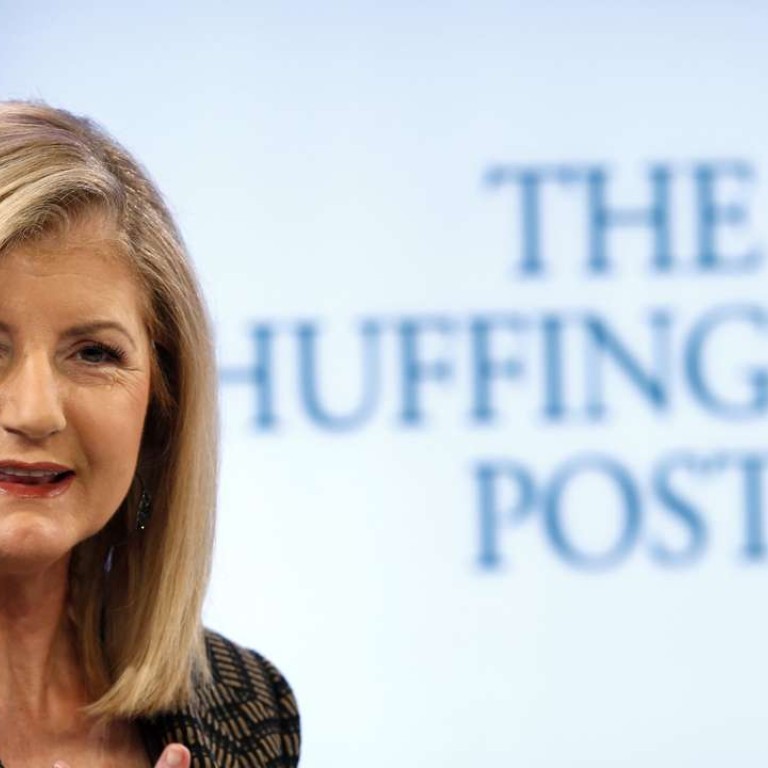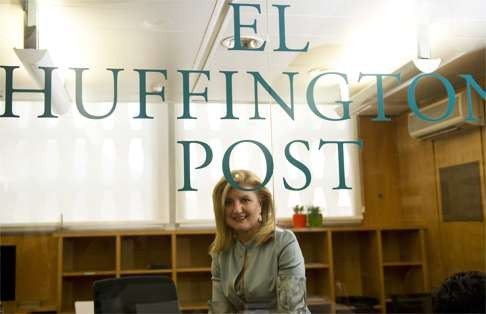
Influential, shrewd and quirky: how Arianna Huffington changed the internet
Arianna Huffington, The Huffington Post’s editor-in-chief, announced Thursday that she’s leaving to head a new health, wellbeing and productivity startup
Founders of media organisations inevitably put their stamp on their inventions. And so, as Arianna Huffington steps down from the site she began in 2005 - and which she sold for a fortune in 2011 - the Huffington Post is many things: bigger than life, easy to mock and full of contradictions.
“I thought HuffPost would be my last Thrive act,” she tweeted Thursday morning, in announcing her next move, surprising because she had signed a new four-year contract last year. But, she said, she wanted to devote herself to the health issues that have captivated her in recent years, and the contract apparently had a loophole allowing her to start a new project.
In today’s digital media world, HuffPo feels almost ancient, although it is less than a dozen years old. As Jeff Jarvis, author and City University of New York media professor, recalls, few took it seriously in the earliest days.
“They laughed when Arianna sat down to the keyboard. Blogs? Celebrities? But she soon proved her doubters wrong, building a formidable media - and political - force,” Jarvis said.
Along the way, the Greek-born 66-year-old who once ran for governor of California has gathered a share of criticism - including for giving bloggers no compensation other than a platform.
With her distinctive accent, perfectly blown-out hair and New Age axioms, she also gathered her share of mild mocking, including on “Saturday Night Live”. She sometimes seemed not just from another continent, but another planet altogether.

They laughed when Arianna sat down to the keyboard. Blogs? Celebrities? But she soon proved her doubters wrong, building a formidable media - and political - force
Frank Sesno, a former CNN correspondent and now director of George Washington University’s media and public affairs school, said she caught the wave of a changing media world - but whether she advanced journalism is debatable.
“While Huffington Post did some reporting that was distinctive, mostly it made its way by aggregating existing content” and, he noted, “packaging it with an SEO obsession.” (The reference is to search engine optimization - making content easy to find for the Googling audience.)
The site’s distinctive reporting was sometimes of the highest quality, as was recognised with a Pulitzer Prize in 2012 for its military correspondent David Wood’s deep reporting of the lives of severely wounded veterans. Huffington Post also offers some strong beat reporting.
But Sesno notes that she was “not afraid to push the envelope on clickbait and the seductive in order to build audience.”
In 2012, it had the largest digital audience in the nation, according to one ranking service.
Meanwhile, Huffington herself had made her way onto every list of influential media figures - a celebrity in her own right and, for many women, a role model, one of a handful at the top of media’s totem pole.
“There was Arianna, Katharine Graham and Tina Brown,” recalls Ben Domenech, publisher and co-founder of the Federalist, a center-right digital site for politics and culture, referring to The Washington Post’s longtime publisher and the British journalist who once edited the New Yorker magazine, among others.
Her greatest influence, though, Domenech said, was inadvertent but huge: “One of her biggest legacies was to elevate Andrew Breitbart,” Huffington’s former researcher who helped found the site and became, before his death, a huge factor of the growth of right-wing media including his own Breitbart.com.
There’s plenty of paradox there, given HuffPo’s well-earned reputation as a liberal bastion.
“The site also gave rise to many others, of all political stripes, with its implicit message that ”you could form a publication out of all these disparate views,“ Domenech said.
Whatever reservations one might have about some of the journalism on the Huffington Post, or about its founder’s eccentricities, no one should question her business acumen.
She sold the site at the right moment, and for the astonishing sum of $315 million, to AOL, which in turn is now owned by Verizon. (As a point of comparison, Amazon founder Jeff Bezos bought the Washington Post two years later for $250 million.)
“She has always been an entrepreneur, activist and advocate much more than a journalist,” said Michael Hirsh, national editor of Politico magazine. He called her “a great businesswoman to have taken what is hardly a real publication, more of a mishmash,” and sold it so successfully.
As for Huffington herself, her new focus is a disappointment for some of those who have watched her career. Jarvis said he misses the “old, political Arianna,” who turned her attention to squishy-sounding health issues in recent years. “Arianna took to telling us how to sleep,” Jarvis said, “when I wished she would tell us to wake up.”

